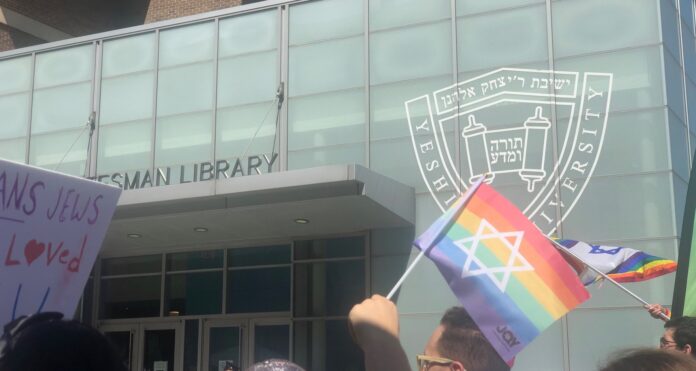New York’s Orthodox Jewish Yeshiva University is refusing to allow an LGBTQ group to operate on campus despite a Supreme Court ruling which found in the group’s favor.
YU announced on Sept. 16 that it was suspending all undergraduate club activities throughout the college. The move is an end run against the Court’s ruling and another step toward banning an LGBTQ student group, the YU Pride Alliance, and denying it equal access to campus facilities as other campus clubs, including a classroom, bulletin boards and a club-fair booth.
The YU action came following a ruling in which the Supreme Court ordered the university to recognize the student group. “If applicants seek and receive neither expedited review nor interim relief from the New York courts, they may return to this court,” the Supreme Court order said.
In 2018, a group of LGBTQ students formed the YU Pride Alliance and sought formal recognition as a student association so they could organize lectures and hold meetings, among other activities. The university claims that the group violates the basic precepts of the Orthodox religion, which is anti-homosexuality.
In an effort to maintain its ban on the YU Pride Alliance without violating the Supreme Court ruling, the university issued a broad announcement on all student activities. Using the Jewish high holidays of Rosh Hashanah and Yom Kippur, which begin Sept. 25 at sundown and run for 10 days, as an excuse, the university sent out a brief unsigned email at close of day Friday about the issue.
The email said that the university would “hold off on all undergraduate club activities while it immediately takes steps to follow the roadmap provided by the US Supreme Court to protect YU’s religious freedom.”
In an email on Sept. 17, Katie Rosenfeld, one of the attorneys for the student group, said that the university’s decision to cancel all club activities rather than follow the court ruling was “a throwback to 50 years ago when the city of Jackson, Miss., closed all public swimming pools rather than comply with court orders to desegregate.”
Rosenfeld said, “The Pride Alliance seeks a safe space on campus, nothing more. By shutting down all club activities, the YU administration attempts to divide the student body, and pit students against their LGBT peers. We are confident that YU students will see through this shameful tactic and stand together in community.”
In a statement responding to the Supreme Court decision, university president Rabbi Ari Berman said YU “would follow the court’s instructions and seek expedited relief.”
“Every faith-based university in the country has the right to work with its students, including its LGBTQ students, to establish the clubs, places and spaces that fit within its faith tradition,” Berman said.
YU had petitioned the Supreme Court to reject a lower court ruling that the college recognize the YU Pride Alliance as an official student organization. In an emergency application, YU asserted that “As a deeply religious Jewish university, Yeshiva cannot comply with that order because doing so would violate its sincere religious beliefs about how to form its undergraduate students in Torah values.”
Attorneys for the Becket Fund for Religious Liberty, which represents YU, stipulated in the emergency application that the lower court’s order is an “unprecedented” intrusion into the school’s religious beliefs and as such is a clear violation of YU’s First Amendment rights.
The New York Supreme Court ruled in June that Yeshiva University must recognize the YU Pride Alliance because the school is not a religious corporation and does not qualify for a religious exemption to the New York City Human Rights Law. New York Supreme Court Judge Lynn Kotler wrote that Yeshiva’s “refusal to accommodate the group violated the city’s anti-discrimination law.” She found that YU was “an educational institution first and foremost.” The school was free to recognize the club without endorsing its mission, Kotler said.
Kolter had ordered YU to grant the Pride Alliance “full and equal accommodations, advantages, facilities, and privileges afforded to all other student groups.”
YU responded with the lawsuit.
The Pride Alliance had its own response to the university’s lawsuit, writing, “YU’s refusal to recognize the YU Pride Alliance sends a stark and painful message of rejection and non-belonging to its LGBTQ students and their allies… An official LGBTQ student club is not only Plaintiffs’ right as students, it is necessary to their health and well-being on campus.”
In its petition to the courts, the alliance said,“[Yeshiva University] may not deny certain students access to the non-religious resources it offers the entire student community on the basis of sexual orientation.”
The Supreme Court’s ruling contravened recent rulings in religion-based cases. In a dissent written by Justice Samuel A. Alito Jr. and joined by Justices Clarence Thomas, Neil M. Gorsuch and Amy Coney Barrett, Alito said it was “disappointing that a majority of this Court refuses to provide relief.” Alito wrote that the court would likely hear the case if YU were to lose its appeal at the state level. Alito added that the university “would likely win if its case came before us.”
Yeshiva University was founded more than 100 years ago to promote the study of Judaism and has a student body of about 5,000. The university also grants degrees in a range of non-religious disciplines such as sciences and business.
Rabbi Berman said in his statement to the university that “As our commitment to and love for our LGBTQ students are unshakeable, we continue to extend our hand in invitation to work together to create a more inclusive campus life consistent with our Torah values.”
Yet Berman’s decision is that YU rescind all student activities rather than allow the LGBTQ group to be part of campus life.

